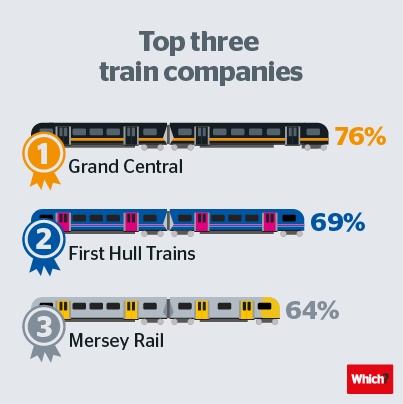16.02.15
Open access operators continue to get passengers' top ratings
Three non-DfT-franchised operators have taken the top spots in the new Which? train customer satisfaction survey.
Grand Central and First Hull Trains, open access operators that mostly run long-distance services between London and northern England, took first and second place, with scores of 76% and 69%, respectively. Merseyrail, which is contracted out by Merseytravel, the Merseyside Passenger Transport Executive, came in third with 64%.
Seven operators failed to score more than 50%, with London operators and those who mostly serve commuters consistently rated worst. Thameslink & Great Northern (TSGN, a franchise operated by First Capital Connect until September 2014) came last, scoring an uninspiring 43%. The service was rated ‘poor’ for everything other than the frequency of the service.
One passenger told Which?: “The trains are out of date and tatty, there aren’t enough carriages and the fares don’t reflect the level of service.”
TSGN, operated by Govia Thameslink Railway, will be hoping that the introduction of the new Siemens-built Class 700 stock from next year starts to overhaul these poor perceptions.
Southeastern with 44% and Southern with 46% rounded out the bottom three. The other operators who scored under 50% were Northern Rail, ScotRail, Abellio Greater Anglia and First Great Western.
The survey also showed that train companies are not doing enough to let passengers know about their compensation rights when they’re delayed.

Richard McClean, managing director at Grand Central Rail, said: “I’m very proud of Grand Central’s fantastic achievement, which really does highlight that small can be beautiful. As an open-access operator employing just 130 staff, we are able to achieve great results."
RTM recently interviewed McClean, which can be found here.
A quarter of all passengers were delayed when they last travelled by train, according to the survey, and one in 20 were delayed long enough to claim compensation from the train company. But three-quarters of those delayed for more than an hour on their last journey, who would have qualified for a full refund from the train company, were not told that they could claim compensation.
Southern were found to have the most delays, but Southern passengers told Which? the operator does the least to let them know about compensation for delays.
Only two in 10 of those delayed long enough to claim were informed about their compensation rights. In contrast, four in 10 of London Overground passengers delayed long enough to claim compensation on their last journey were told their rights. And around a third of South West Trains customers entitled to claim said they were told of their rights.
The National Passenger Survey, run by rail and bus watchdog Passenger Focus – soon to become Transport Focus as the strategic roads network is becoming part of its portfolio – also found that almost nine in ten of those apparently eligible for compensation for their delay did not claim, mostly due to a lack of awareness. Passengers told the survey they think that making a claim will take too much time, is too complicated, or that they won’t get enough money back.
David Sidebottom, director at Passenger Focus, said: “Passengers have told us that punctuality and how well train companies deal with delays are the biggest factors in whether they are satisfied with the overall service. The top issues raised by passengers contacting Passenger Focus include train delays, refund conditions and levels of compensation.”
“This is a problem that needs addressing. When trains are delayed or cancelled, it is important that passengers are made aware of their rights to a refund or compensation. We want train operators to do more to inform passengers of their rights, to give fairer compensation and to give that recompense in the form that passengers actually want – such as cash or a card refund.
“For commuters, we want train operators to recognise the impact on work and home life of frequent delays under 30 minutes by offering some recompense. We also think compensation should be calculated in a much fairer way – currently the formula used assumes that people never take any holiday, and work on Christmas Day and Boxing Day even when trains don’t run!”
Research by the Office of Rail Regulation that found 11% of survey participants ‘always’ or ‘usually’ claim compensation when they are delayed, 15% ‘rarely’ claim and 68% ‘never’ claim compensation.
A spokesperson for the Rail Delivery Group, which represents rail operators and Network Rail, said: “The timetable is our promise to passengers. While almost nine out ten trains now arrive on schedule, we are investing billions of pounds so that we make good on that promise more often and improve passengers’ satisfaction with our services.
“Compensation payments are increasingly generous and easy to apply for and are often made regardless of the cause of a delay. This is why the amount paid out to passengers under the Delay Repay scheme increased by £10m between 2013 and 2014, despite punctuality improving over that period. ”
Tell us what you think – have your say below, or email us directly at [email protected]